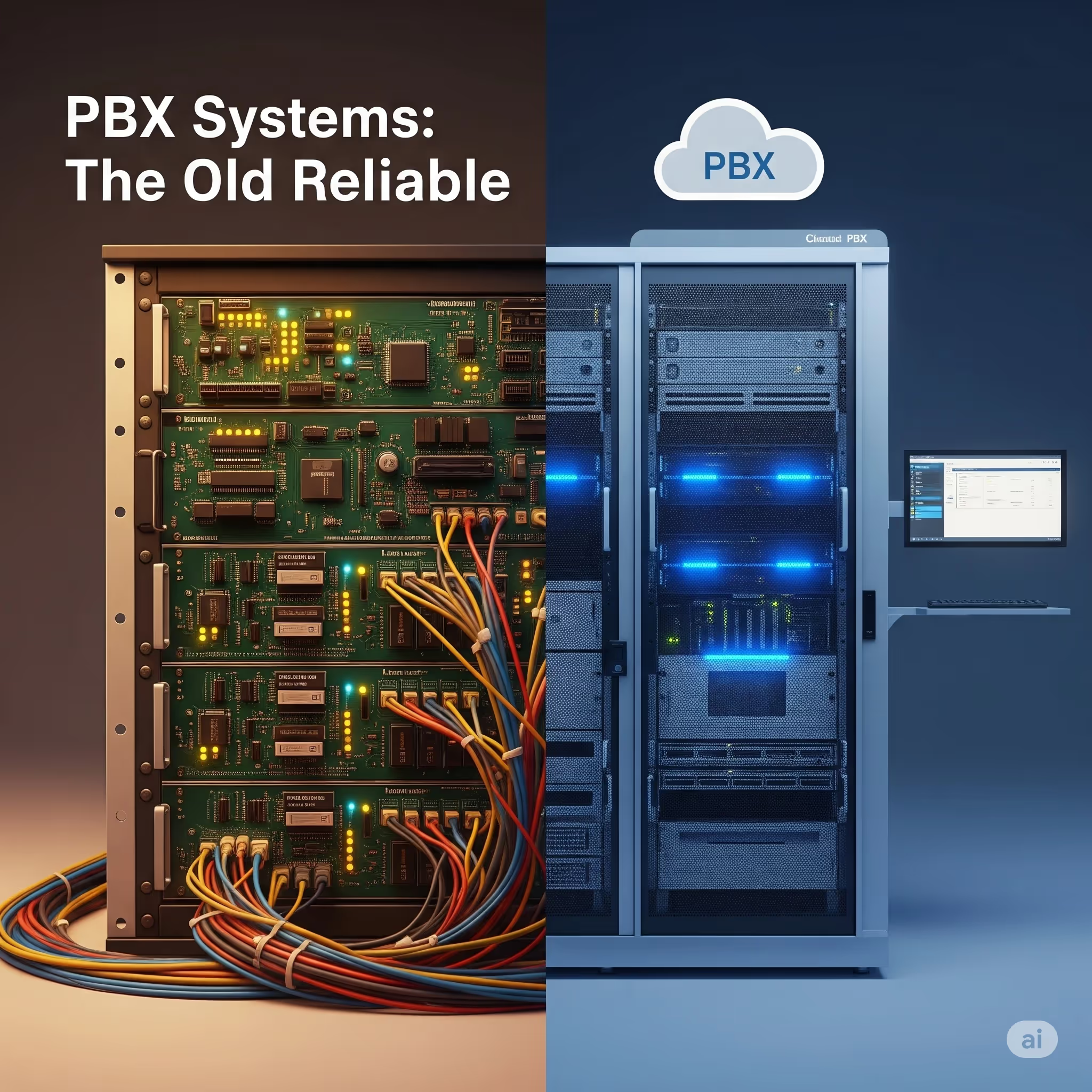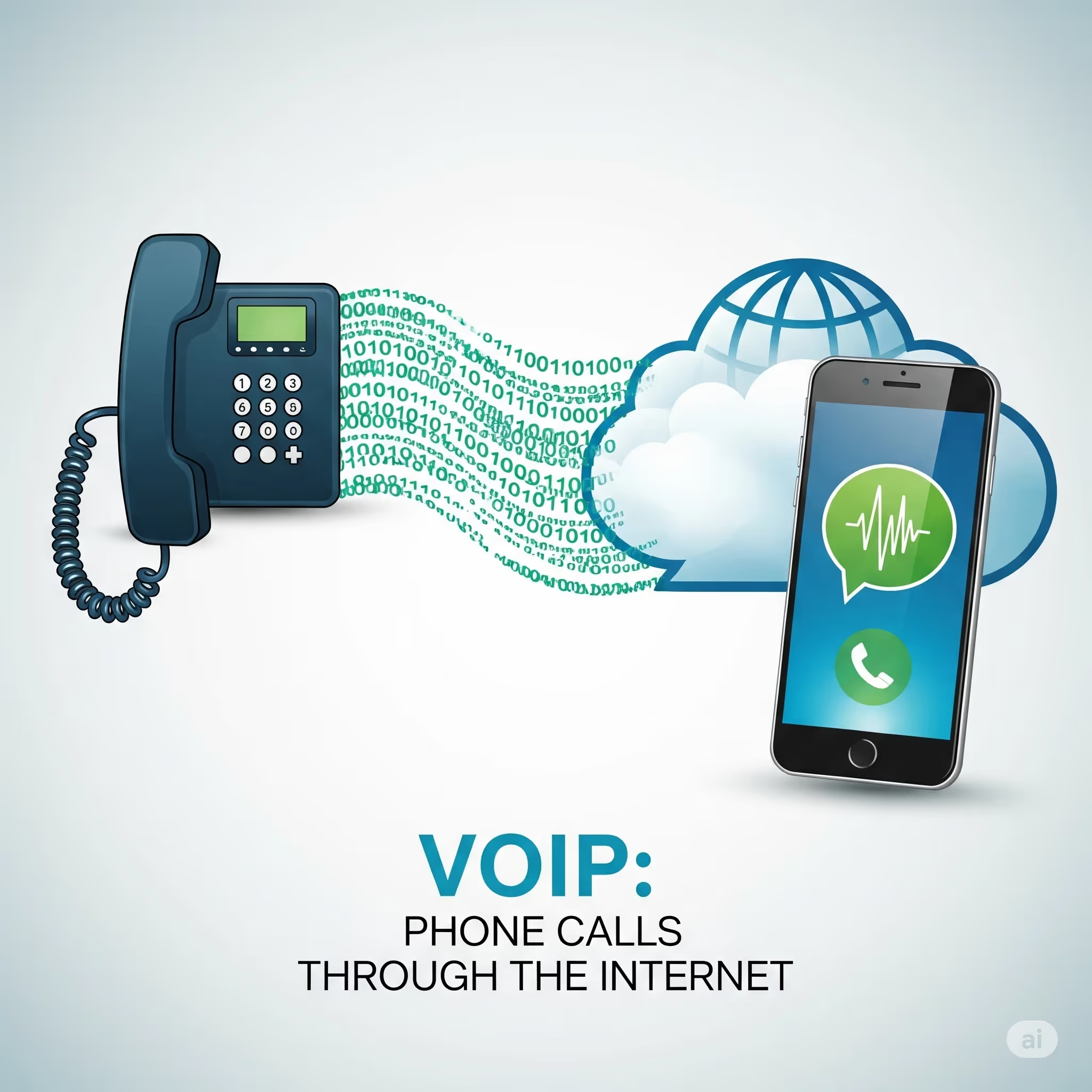
PBX vs VoIP: Understanding Business Phone Systems
Summary:
This guide explains PBX vs VoIP phone systems in plain English, based on 13+ years of real client work. It shows actual costs (VoIP typically saves $7,000+ first year), when each system makes sense, and why 75% of businesses now choose VoIP.
Readers get practical advice on implementation timelines, common mistakes, and honest scenarios where traditional PBX still wins. No sales fluff, just straight talk to help business owners pick the right phone system for their situation.

Look, I get it. Phone systems are boring until yours breaks down at the worst possible moment. Last month, I had a client whose PBX died during their biggest sales week of the year. Three days of missed calls and scrambling for solutions. Don't be that guy.
I've been setting up business phone systems since 2010, back when VoIP was still the "new thing" that nobody trusted. Now? It's everywhere. But that doesn't mean it's automatically right for every business.
Let me save you some headaches and walk you through what matters when picking between PBX and VoIP.
What’s the real difference between PBX and VoIP?
PBX Systems: The Old Reliable

PBX stands for Private Branch Exchange. Fancy name for your office phone system that sits in a closet somewhere and routes calls around.
Picture this: big metal box, lots of wires, probably humming quietly in your IT room. When someone calls your main number, the PBX decides where that call goes. When Sarah in accounting dials extension 105 to reach Mike in sales, the PBX handles it without using an outside line.
Been around forever. Works like this:
- Internal calls stay internal (free)
- External calls grab an available phone line
- Features like hold, transfer, and voicemail are all built in
- That robotic voice saying, "Please hold while we transfer your call."
Nothing groundbreaking, but it works. My oldest client still runs a PBX system from 2005. Things bulletproof.
VoIP: Phone Calls Through the Internet

VoIP means Voice over Internet Protocol. Your phone calls travel through the same internet connection you use for email and web browsing.
Instead of traditional phone lines, everything runs through your network. Your voice gets chopped up into tiny digital pieces, shot across the internet, and rebuilt on the other end. Happens so fast you don't notice, some companies even ask is PBX a VoIP gateway when looking at hybrid setups.
But here's where it gets interesting. Since it's all digital, you can do stuff that regular phones can't:
- Answer your office phone on your cell phone
- See who's calling before you pick up
- Join video meetings from your desk phone
- Get voicemails sent to your email
- Pull up customer info automatically when they call
Started using VoIP myself around 2012. Took some getting used to, but now I can't imagine going back.
Understanding the Difference Between PBX and VoIP
Money talks, so let's talk money. I'll give you actual numbers from businesses I've worked with.
PBX Reality Check: Thompson Manufacturing, 25 employees. Bought a new PBX system in 2022:
- Equipment: $12,000
- Installation: $3,500
- Monthly phone bills: $750
- Adding 5 new employees: $2,200 more
Total first year: $21,700
VoIP Reality Check: Downtown Law Firm, 23 employees. Switched to VoIP in 2023:
- Setup fees: $800
- Monthly service: $1,150 ($50 per person)
- Adding 5 new employees: $250 more per month
Total first year: $14,600
That's a $7,000 difference right there.
The Flexibility Game Changer
Remember March 2020? Everybody went home overnight. Companies with PBX systems were forwarding calls to personal cell phones and praying. VoIP companies? Business as usual, you need to know the difference between business VoIP and PBX systems before investing.
I had a client, a small marketing agency. Their entire team went remote in one day. With VoIP, everyone just downloaded the app on their phones and laptops. Clients couldn't even tell they weren't in the office.
Another client tried to do the same thing with their PBX. Disaster. Calls going to voicemail, customers getting frustrated, deals falling through. They switched to VoIP three months later.
Is PBX a VoIP gateway?
I'm not anti-PBX. Sometimes it's still the right choice.
Terrible Internet, the Rural construction company I work with has internet that barely loads email. PBX runs on phone lines, which work fine out there. VoIP would be choppy and unreliable.
Paranoid About Security, a Defense contractoclientnt needs everything on-site. No cloud, no internet-based anything. PBX keeps its calls internal and off the web.
Just Bought New Equipment Restaurant chain spent $40,000 on PBX equipment in 2023. Makes sense to use it for a few more years before switching.
Change-Resistant Team Family business where the owner has been using the same phone system for 15 years. Sometimes fighting change isn't worth it.
Why Everyone's Going VoIP
Numbers don't lie. About 75% of my new installs are VoIP now. Here's why:
It's Stupid Easy to Scale. Added a new employee to a VoIP system last week. Took 8 minutes. It would've taken a PBX technician half a day and $300.
Remote Work Works. Your sales guy can be at a coffee shop in Denver and still answer the main office line. Try that with a traditional phone.
Features You Want: Video calls, screen sharing, instant messaging, and mobile apps. Stuff that costs extra (if available at all) on PBX systems.
Updates Happen Automatically. VoIP systems get better over time. New features just show up. PBX systems... You get what you bought in 2015.
Picking the Right One
Stop overthinking it. Here's my cheat sheet:
Go VoIP if:
- Your internet doesn't suck (20+ Mbps for small offices)
- You want to save money upfront
- Anyone works remotely
- You like having options and features
- You're planning to hire people
Stick with PBX if:
- Your internet is unreliable
- You need everything on-premises for compliance
- You just bought new equipment
- Your team hates change more than inefficiency
What Happens During Setup
VoIP setup isn't instant, despite what salespeople tell you.
Small business (under 15 people): 1-2 weeks Medium business (15-40 people): 2-4 weeks
Larger companies: 4-8 weeks
Most of that time is spent waiting for number transfers and scheduling training. The actual technical setup usually takes a day or two.
Pro tip from 13 years of doing this: test with a few people first. Pick your most tech-savvy employees to try it out for a week. They'll catch problems early and help train everyone else.
Common Screwups to Avoid
Undersized Internet: Had a client try to run 20 VoIP phones on a 10 Mbps connection. Sounded like everyone was talking underwater. Upgrade your internet first.
Skipping Training. Bought a fancy VoIP system with 50 features. Employees only use it like a regular phone. Waste of money. Train your people.
Cheap Provider: Went with the lowest bidder on VoIP service. Calls dropped, and support was terrible. Sometimes paying a little more saves you a lot of headaches.
No Backup Plan. What happens when your internet goes down? Have a plan for forwarding calls to cell phones or getting backup internet.
My Honest Recommendation
Most businesses should switch to VoIP, but timing matters. If your current system works fine and you're not growing fast, no rush. But when it's time to upgrade or expand, VoIP usually makes more sense.
Biggest mistake I see? Companies are limping along with old systems that cost more to maintain than to replace. Don't throw good money after bad.
Your phone system should help your business grow, not hold it back. Whether that's PBX or VoIP depends on your situation, but now you know what questions to ask.
Ready to Supercharge Your VoIP System?
Don't just take our word for it. Watch how PowerDialer.ai transforms regular business calls into a competitive advantage. PowerDialer.ai turns your business phone system into a sales machine. Start deciding difference between VoIP and PBX, smart businesses are already using AI to:
Quick Questions
Can I keep my phone numbers?
Yep. Takes about 2-3 weeks to transfer them over. No downtime during the switch.
What if my internet crashes?
Most VoIP systems forward calls to your cell automatically. Smart businesses also get backup internet.
Does VoIP sound as good as regular phones?
Better. HD voice is clearer than old phone lines, assuming you have decent internet.
How much internet do I need?
Roughly 100k per call. If 8 people might be talking at once, you need at least 1 meg dedicated to phones.
Can I use my old phones?
Maybe. Newer digital phones often work with adapters. Analog phones need special boxes. Usually easier to get new IP phones.
Is it secure?
Good VoIP providers encrypt everything. Probably more secure than your old phone lines, honestly.
